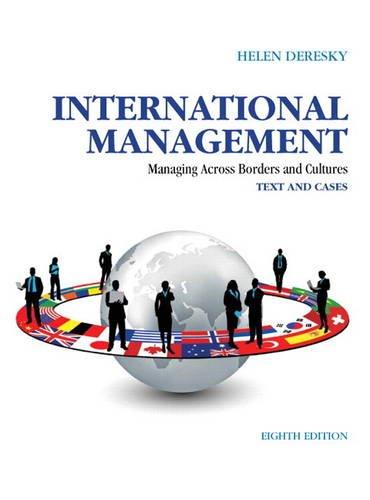Over the years, AstraZeneca Plc (AstraZeneca) has developed a strong reputation for its expatriate management practices. Expatriate
Question:
Over the years, AstraZeneca Plc (AstraZeneca) has developed a strong reputation for its expatriate management practices. Expatriate management at AstraZeneca went beyond tackling issues such as compensation, housing, issues related to the spouse’s career abroad, etc. It also took care to ensure that employees on international assignment were able to adapt well to the new environment and achieve a work/life balance. With the global economic situation continuing to be grim, AstraZeneca also began placing emphasis on a “more thoughtful planning and selection process” of candidates for international assignments.
AstraZeneca is the world’s fifth-largest pharmaceutical company by global sales. It is headquartered in London, UK and Södertälje, Sweden. For the year 2008, AstraZeneca’s revenues were US$31.6 billion and it employed around 66,000 employees. As of 2009, AstraZeneca had around 350 employees working on international assignments in 140 countries worldwide. These were employees who were on short-term, long-term, or commuter assignments. According to Ashley Daly (Daly), senior manager of international assignments for AstraZeneca in the U.S., the company’s employees were mainly concentrated in Belgium, the U.S., and the UK, but they “also have a significant presence in the Asia-Pacific and Latin America regions.” AstraZeneca’s policy stipulates that for any international assignment, there had to be a business rationale. The company saw to it that the costs involved were acceptable, and that the career management of the employee during the assignment was consistent with personal development goals as well as business needs. The contractual arrangements for the assignment were also centrally managed. “From the outset, if there is not a clear sense of how the international assignment experience can be applied at the end of the assignment term—at least in broad terms—the business should strongly consider whether an international assignment should even move forward,” said Daly.
Once an assignment offer was made to a potential expat, AstraZeneca paired them up with an international assignment manager (“IA manager”), who briefed them on company policy and opportunities for cultural and language training. Before leaving for their international assignment, employees were provided training in a workshop that focused on relevant issues (such as leaving the destination location and returning back to the home country). The expats were given information about the culture of the destination country—particularly differences with the home country—as well as social considerations and do’s and don’ts. If necessary, the employee and his/her spouse were given training in the local language. Tessi Romell (Romell), research and development projects and HR effectiveness leader at AstraZeneca, said that the company also helped connect new expats with those who had already served in that location.
Sometimes, follow-up workshops were held in the host country. Once on assignment, expats stayed in touch with their IA manager in addition to the manager they reported back to in the home country. AstraZeneca saw to it that expats were given the necessary flexibility required for them to achieve a work/life balance. “AstraZeneca is really good at allowing people to manage their own time and being aware that we are working across different time zones. It’s always something that we try to take into consideration so we don’t have people [taking care of work matters] in the middle of the night,” said Romell.
Questions
1. Critically analyze AstraZeneca’s expatriate management practices.
2. According to the 2007 Expatriate Work/Life Balance Survey, 65 percent of expats report feeling the strain of managing the demands of work and home, leading to more anxieties at home and at the workplace. What steps can an organization take to mitigate this?
3. What decisions related to expatriates can organizations take to maximize the benefits to the company despite the ongoing economic recession? Do you think a company that paid more careful attention to selection could further boost their chances of success?
Step by Step Answer:

International Management Managing Across Borders And Cultures Text And Cases
ISBN: 9780133062120
8th Edition
Authors: Helen Deresky





